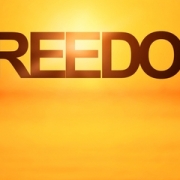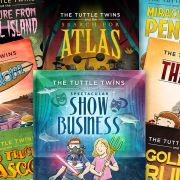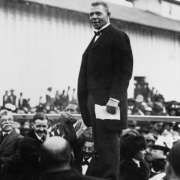On Sunday June 28th, comic genius and Poetic Justice Warrior Mel Brooks turned 94 years young, and his youthful exuberance for human life is more relevant than ever. For example, in the decade of the 1970s, Brooks produced several movies that were among the top ten moneymakers in the year they were released. One was a throwback to production qualities that had been abandoned fifty years before that – Silent Movie. Starring Paul Newman, the film’s only speaking part belonged to Marcel Marceau, the world’s most celebrated mime.
Yet Brook’s transcendence is proven with the first of these movies, The Producers (1967), which was re-created into a hit Broadway musical nearly 40 years later. For Brooks, absurdity is an art form to be molded into a weapon against the endless absurdities of collectivism, particularly its most vile form, bigotry. Its politically correct version thrives today.
The premise of The Producers is to make a quick buck by creating the worst stage musical ever, or as he put it, “two schnooks on Broadway who set out to produce a flop and swindle the backers.” Regarding Brooks’ debut as movie director for this plot line, he asked himself what play “would have people packing up and leaving the theater even before the first act is over.” His answer was to combine Hitler’s inhumanity with a musical comedy – Springtime for Hitler. Many years later he explained,
If I do Springtime for Hitler it’ll never be forgotten. I think you can bring down totalitarian governments faster by using ridicule than you can with invective.
Fast forward fifty years, what could be a greater flop that swindled its backers more than the totalitarian forces that dominate American universities? Not only has it has poisoned two generations of students with tribal politics and the bigotry of low expectations, it has converted them into angry social justice warriors who lack all historical and economic context.
Are We Woke? We’re Not Guilty.
The bigotry of low expectations treats non-whites as special needs children. One of the funniest and brilliantly acted movie scenes to crush this malevolence features Sheriff Bart, played by Cleavon Little, in Brooks’ classic 1974 western movie parody, Blazing Saddles.
The scene portrays Bart kidnapping himself by holding his gun to his own head because the comical, bigoted townspeople had become a lynch mob. Knowing they have nothing unless he behaves as they think they’ve conditioned African Americans to behave, Bart takes on two persona at the same time while interacting with the mayor. The dialogue proceeds kidnapper — mayor — kidnapper — victim:
Hold it, the next man makes a move, the ‘capitalist’ gets it! Hold it men, he’s not bluffing. Listen to him men, he’s just crazy enough to do it! Drop it, or I’ll swear I’ll blow this ‘capitalist’s’ head all over town. Oh lordy, he’s desperate! Do what he say! Do what he say!
In addition, Brooks carefree use of epithets in Blazing Saddles is an important lesson in historical and situational context. When Americans don’t learn the complexity of circumstances that surround events or discoveries, all they have are the floating concepts that led us to multiculturalism.
As is typical of today’s race pimps, the bigots morphed into advocates for their victim after inducing him to play victim, “Isn’t anybody going to help that poor man? Hush Harriett, that’s a sure way to get him killed!” Bart, as his own victim, continues, “Help me, help me, somebody help me! Bart as kidnapper, “Shut up!” Safely inside the jailhouse, and back to his being a whole individual, Bart congratulates himself while Brooks, as director, breaks the fourth wall, “Oh baby, you are so talented, and they are so dumb!”
Here, looking directly into the camera (the fourth wall in movies), Cleavon Little alludes to the moral imperative of self-creation (independence as a virtue) versus the categorical imperative of social sacrifice (independence is a vice). In his new domain as Sheriff of Rock Ridge, Sheriff Bart discovers a passed out drunk in the jail cell – the Waco Kid played by Gene Wilder. Hearing the Kid stir while hanging over the side of his bunk, Bart walks to the cell and asks, “Are we awake?” The Kid opens his eyes, gazes at the new Sheriff, and replies, “We’re not sure. Are we black?” Bart answers,”Yes, we are” and the Kid decides, “Then we’re awake, but very puzzled.”
The meaning of this exchange is opposite to the sub-header for this section; the script has actual meaning. To be awake means a mind perceiving reality and forming basic concepts. To be woke, in today’s parlance, is a floating concept supported by envy and guilt whose purpose is decivilization. In the movie, “We’re not sure” signals the formation of a concept that is contrary to experience, and requires further understanding. It’s opposite, “We’re not guilty,” is the statement of a negative supported by inaction, except assigning guilt to others.
Token’s Life Matters
“Are we black” is the logical question for Wilder’s character. Its knowledge will help him consider new propositions to test. These are basic critical thinking skills that great teachers (Montessori, VanDamme, Collins, Gatto) advance. Government school curriculum, not so much.
The achievement of this scene is the almost immediate bond established between these two characters. From different cultures, careers, and ethnicity, they recognized similar character traits in each other, ones that Brooks wrote into the script. They did not expect others to live for their sake, or sacrifice themselves out of duty to others, unless it was voluntarily accepted. Both were dedicated to pursuing their rational self-interest, defended each other’s right to do the same, and enjoyed an enduring, mutually profitable partnership because of it.
The universal truth of this lesson is lost in all political discourse, yet it’s inherent in rational economic interactions. Brooks, being the great comic entrepreneur explains, “My job is to go out and entertain the most people possible.” For the malevolent universe types who assign guilt and believe life is the avoidance of death, Brooks has some advice, “Life is the very opposite of death.”
In the face of real bigotry, including the politically correct kind that emanates from ivy covered lecture halls and bullhorns roaming the streets of New York City to this day, Brooks took purposeful action,
If you don’t laugh you’re going to cry – that’s probably what’s responsible for the Jews having developed such a great sense of humor. The people who had the greatest reason to weep, learned more than anyone else how to laugh.
And laugh we do. As Poetic Justice would have it, Brooks skewered a literary legend (stolen and repurposed by the forces of totalitarian redistribution) in his last feature film, 1993’s Robin Hood: Men in Tights. There are no sacred cows in comedy, and twenty years later, the tradition continues with Trey Parker’s and Matt Stone’s animated TV series South Park, and particularly their bigoted, sociopathic character Eric Cartman. Anticipating reality, Cartman appeared in 2016 (the 20th season) wearing his new Token’s Life Matters t-shirt.
On Monday, June 29, 2020, America lost one of Brooks’ great partners, Carl Reiner. Together, they created the 2000 Year Old Man comedy sketch with Reiner as the straight man interviewing the wise, yet unpredictable old guy. On January 20th we endured the passing of another talented partner of Brooks, Buck Henry. Together, they created the iconic TV series whose title is more relevant to our insane decivilization than ever, Get Smart!













